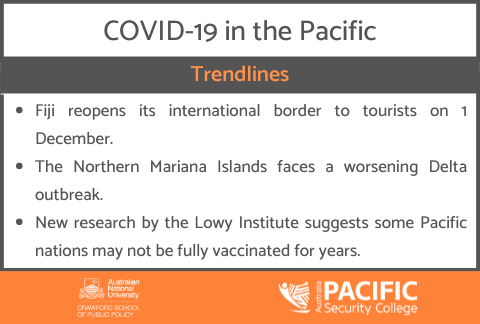
Photo by Kyle Post on Unsplash
COVID-19 – the Pacific response: 2 December
Fiji continues with plans to open borders despite the emergence of the Omicron variant, whilst new analysis has warned that some Pacific countries may not be fully vaccinated for years.
The emergence of the Omicron strain of COVID-19 has created worldwide uncertainty over nations’ pathway out of the pandemic. There is little known about the new variant, however early reports suggest it has the potential to be more transmissible than other strains. Whilst six cases of the new variant have been identified in Australia, no cases have been discovered in the Pacific.
In Solomon Islands, there has been concern about the COVID-19 status of foreign security personnel sent by Australia, Papua New Guinea (PNG) and Fiji, in response to the government’s request for assistance. The country is currently COVID-free, recording just 20 positive cases throughout the pandemic.
Health Minister Culwick Togamana said that all forces on the island are double vaccinated and tested negative upon both their departure from their host country and their arrival in the Solomons. Additionally, the nation recently received 100,620 Pfizer vaccines from the United States, which will be allocated to adolescents aged 12-18.
Here is a snapshot of COVID-19 case numbers and pandemic policy responses in the Pacific Island region, correct as of 12pm AEDT, 1 December 2021.
 Case numbers snapshot
Case numbers snapshot
PNG’s recorded cases of COVID-19 have fallen in the past week, with the nation registering 605 cases over the previous seven days, bringing the country’s total to 35,179 cases and 546 deaths. The Northern Mariana Islands (CNMI) has recorded 313 new COVID-19 cases in the previous seven days, equal to almost 40 per cent of the total number of cases recorded since March 2020.
Fiji’s case numbers continue to decline, with zero cases recorded in the 24 hours to 29 November. The rolling weekly case number average is seven, and it brings the total number of cases in the country to 52,436, with 696 deaths.
New Caledonia recorded 230 cases over the past week, and Guam recorded 20 new cases in the 24 hours to 30 November, bringing its total to 15,123 cases.
The fortnight in review
The importance of vaccinating the Pacific has been highlighted by new research undertaken by the Lowy Institute, modelling the vaccine rollout in Pacific countries. It emphasises that nations such as PNG, Solomon Islands, and Vanuatu will struggle to fully vaccinate their populations by mid-2025. Misinformation, limited health sector capacity, and reluctance of citizens to take the vaccine are predicted as factors that will continue to hinder the rollout going forward.
Despite the new Omicron variant, Fiji has proceeded with reopening to tourists from Australia and other travel partner countries. The nation is ‘open for happiness’, with 800 guests expected over the first 24 hours, and around 30,000 tourists estimated to arrive in December. However, Fiji’s Minister for Tourism warned the tourism industry and general population to adhere to the COVID-19 protocols in place, with the country strengthening travel restrictions from ‘red list’ countries.
CNMI is experiencing a rapidly escalating Delta outbreak, placing the Commonwealth’s health system under strain. Since 28 October, there have been 512 cases reported and 812 in total, with the territory registering 98 cases on 23 November. Whilst cases decreased over subsequent days, there are worries Thanksgiving family gatherings may have spread the virus.
The chief executive officer of the territory’s Commonwealth Health Corporation has stated that the healthcare system is exhausted, despite a vaccination rate of 86 per cent. To reduce community transmission, the Islands are considering making vaccinations mandatory for eligible students, while courts have been directed to undertake virtual hearings.
PNG has reported a decrease in the number of people seeking to receive the vaccine, apparently linked to the reduction in official COVID-19 cases in the month of November. Provinces are already gearing up for a fourth wave of infections around March next year, as some parliamentarians reportedly refuse to promote COVID-19 vaccinations for fear of electoral backlash.
Wallis and Futuna added a three-day quarantine requirement in-country for overseas arrivals, following a false positive case on a repatriation flight from New Caledonia. With the border between the two territories only reopening last week, travellers will still need to spend seven days in pre-departure quarantine in New Caledonia, before the additional three-day requirement.
Meanwhile, New Caledonia has eased some of its more stringent COVID-19 restrictions, whilst extending broader restrictions for a further three weeks. Marriages, family gatherings, church meetings, and concerts will be permitted with capacity limits, and theatres will reopen on the weekend.
In January 2022, Marshall Islands will reduce the quarantine period to enter the nation from 28 to 17 days. Anyone seeking to travel to the country must be fully vaccinated, provided they are eligible.
In French Polynesia, the Council of State is expected to hear a number of challenges to mandatory vaccination laws implemented by the national government in August. A decision is expected within one to three weeks. A verbal slip-up by President Edouard Fritch concerning the death rate of vaccinations has being seized upon by vaccine sceptics and fuelled the anti-vaccine movement in the territory.
In American Samoa, two travellers test positive to COVID-19 whilst in quarantine, bringing its total number of cases to seven. The territory is also beginning a mass vaccination drive on the first three Wednesdays of December, offering cash incentives to those willing to get the jab.
Finally, China has donated US$150,000 to Micronesia, to be used to purchase medical supplies and equipment in its COVID-19 response. Niue is not looking to reopen its international borders until mid-2022, and one of the two positive cases in quarantine in Vanuatu has been cleared by health authorities.
Updated: 16 August 2024/Responsible Officer: Crawford Engagement/Page Contact: CAP Web Team












